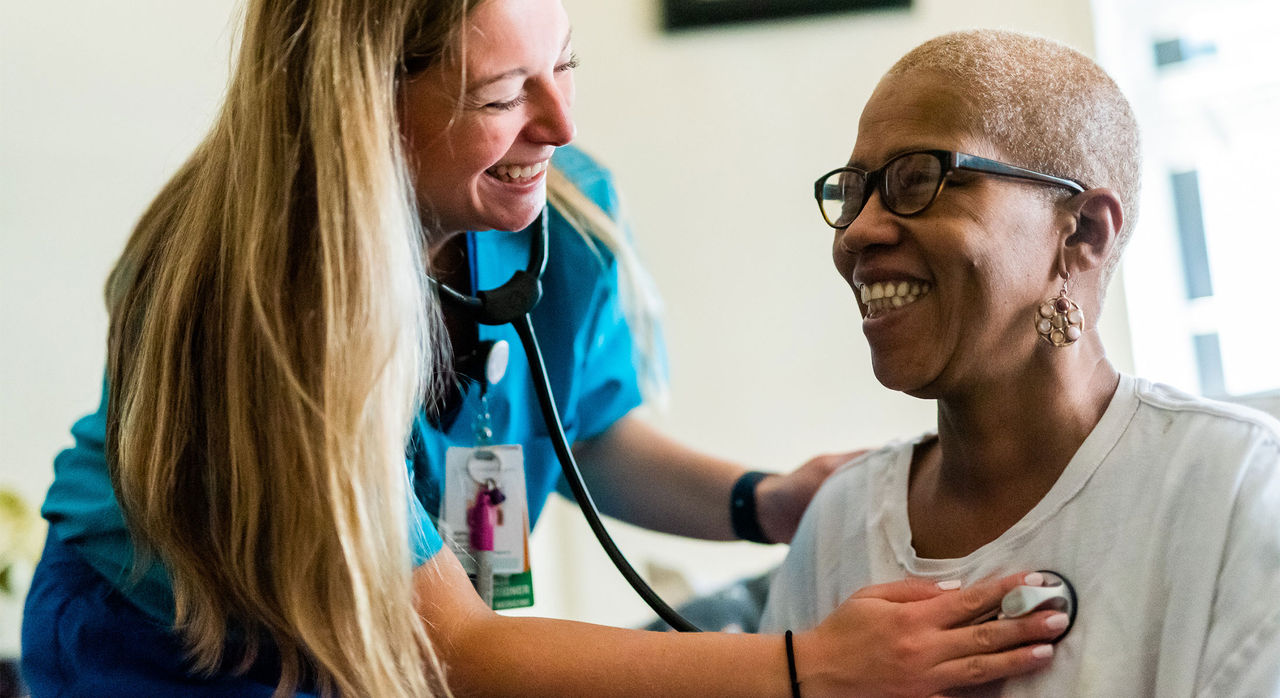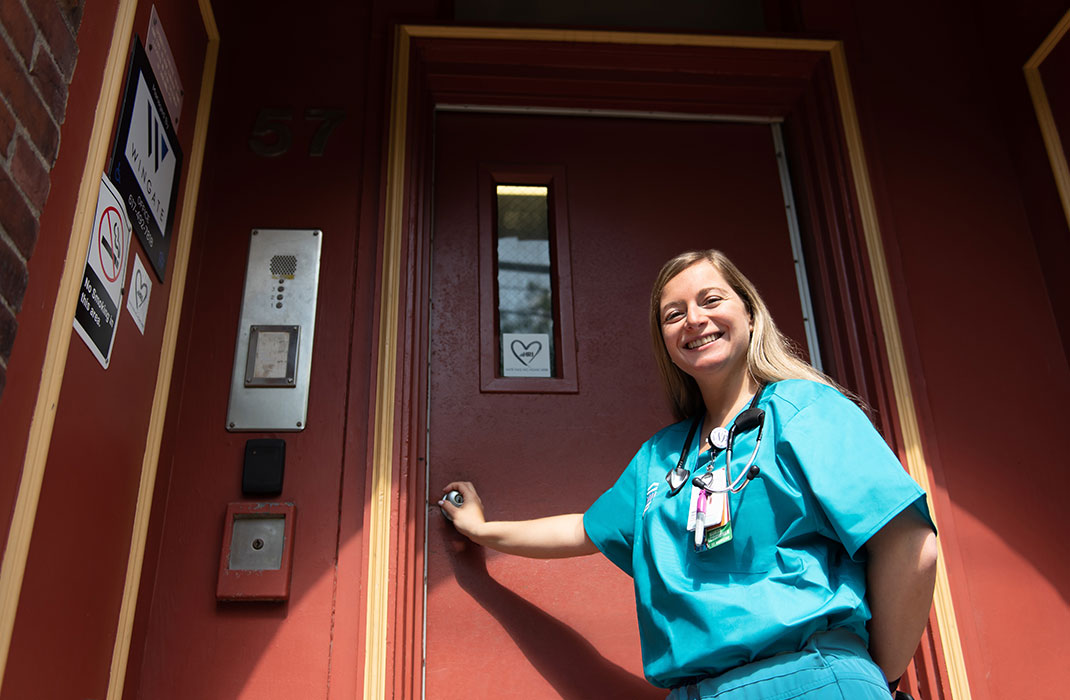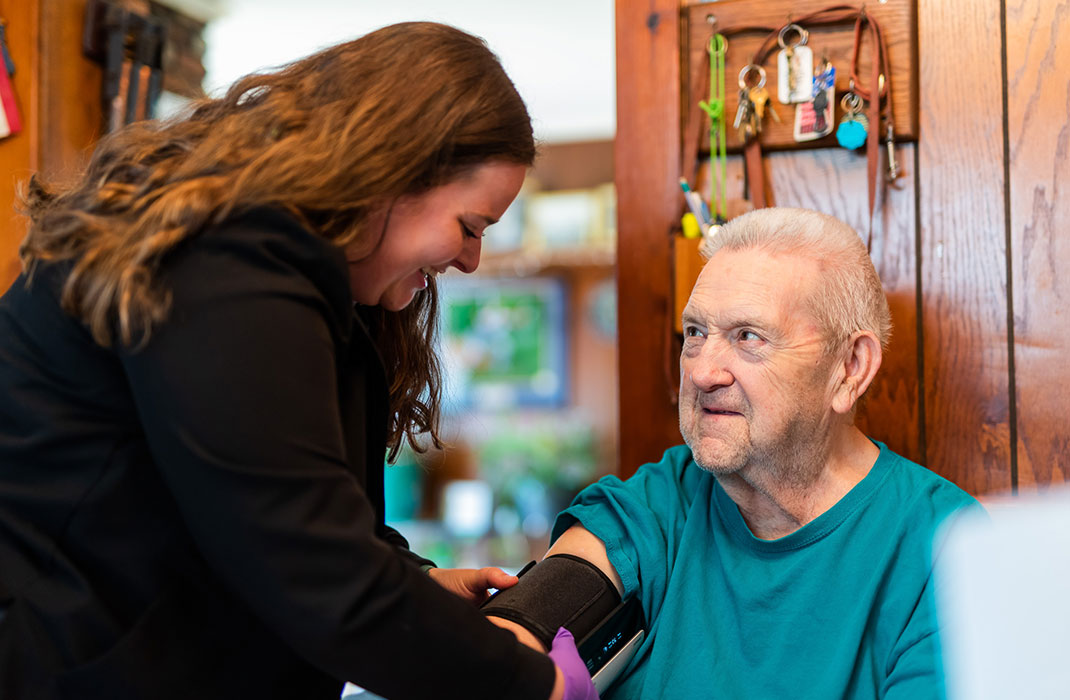Research Shows Inpatient Hospital Care at Home Is Successful

Many Americans think they need to stay at a hospital for the best medical care. The more severe or urgent the condition — their thinking goes — the longer the stay. Family and friends pack bags, prepare meals, and may have a stressful commute to visit their loved ones at medical centers miles away.
Amid the chaos, patients seldom consider another option: inviting that same level of care into their homes.
“For the past century, we’ve been taught that hospitals are the place to receive care when you are very ill,” says David Levine, MD, MPH, clinical director of research and development for Mass General Brigham Healthcare at Home. “But, if our job is to put the needs of patients first, why are we making patients come to us when we can deliver care to them in their homes?”
Mass General Brigham researchers are one step closer to changing this narrative. In a recent study, they assessed the outcomes of nearly 6,000 Americans nationwide who received care for a serious medical condition in their home instead of at a hospital. Their findings validated the safety and effectiveness of receiving sudden, or acute, care at home. Less than 1% of patients died and fewer than 7% had their care escalated into a 24-hour hospital stay.
Dr. Levine and Stephen Dorner, MD, MPH, MSc, chief clinical and innovation officer for Mass General Brigham Healthcare at Home, explain how the home hospital model successfully provides acute care and how Mass General Brigham has leveraged its Home Hospital to address some of the biggest problems in health care.
What is home hospital?
When hospitals admit patients for an acute condition, a provider traditionally requests a patient bed in either:
The intensive care unit (ICU), where a patient needs immediate, critical care and constant monitoring for a potential life-threatening condition or procedure. A patient with traumatic injuries following a car crash, or a patient only a few hours removed from a kidney transplant, may need care in the ICU.
A hospital ward, where nurses, doctors, and other medical providers provide less critical, albeit acute and essential, care. They still monitor patients, but not as frequently as those in the ICU.
Home Hospital provides care at the level of a hospital ward but at a patient’s home.
“It’s the same care, but with the benefit of the patient surrounded by friends and family, or cuddled next to their pet, in a familiar environment,” says Dr. Dorner. “Nobody is performing surgery in the home. That kind of care will always stay within the four walls of a hospital. But we are redefining what it means to receive acute medical care by enabling more healing and recovery inside a patient’s home.”
A collaboration between Mass General Brigham and Best Buy Health has helped deliver these services into homes.
Those who enter the Mass General Brigham Home Hospital receive:
Visits from a nurse or paramedic at least twice a day. A doctor, nurse practitioner, or a physician assistant sees patients at least once a day, either by video or in person. Physical, occupational, and speech-language therapists are available, as needed.
Continuous monitoring of vital signs. Vital signs reflect essential body functions, including body temperature, blood pressure, heartbeat, and breathing rate. Patients are outfitted with monitors to track these measurements and transmit them to their clinical team.
Diagnostic testing when needed, including portable x-rays, ultrasounds, and bloodwork
Access to therapeutics traditionally provided in a hospital, including oral and intravenous (IV) medications, oxygen, food delivery, and social work
24-hour access to members of a care team for questions or concerns at the touch of a button from a tablet. This includes access to paramedics for urgent clinical needs. Current Health, Best Buy Health’s care at home platform, connects patients to nurses, paramedics, advanced practitioners, and paramedics. Lively Mobile Plus, Best Buy Health’s emergency response (PERS) device, can detect falls and enable patients to call for help.
What health care problems does Home Hospital help solve?
Does Home Hospital offer a better patient experience than a facility?
According to Dr. Levine, many patients who receive acute care at home report a better experience than those who receive care in a hospital.
He suspects several reasons why:
1. Reduced risk of infections
Hospitals are a hot spot for health care-related infections. Beds kept in close quarters allow these infections to spread.
Common infections include:
Gastrointestinal (GI), including norovirus
Skin
Blood
Urinary Tract
Respiratory
Post surgical sites
If not properly managed, these infections can complicate care.
2. More independence
Patients can lose a sense of control when admitted into a traditional hospital. They often need to wait to use a bathroom, eat a meal, or meet with family and friends. Home hospitalization allows patients to regain a sense of independence, especially when eating their own food, sleeping in their own bed, and speaking to family members.
Active movement plays an important role in recovery, too. While patients in hospitals are typically restricted to their bed, patients at home can leave their bed whenever needed.
3. Social determinants of health
Doctors cannot see all the variables affecting a patient’s health from inside a hospital room. Home visits allow doctors and other health care providers to understand how to best tailor care.
“We may visit and see the cupboards bare, a broken window, or an infestation of some sort,” says Dr. Levine. “We can act on a lot of those things, and we actually have an obligation to do so.”
4. Discharge procedures
Patients may feel rushed when discharged from a hospital. Depending on their treatment, they may struggle to understand all the paperwork they receive, scheduled follow-up appointments, or the medicines they need to stay healthy.
A provider who discharges a patient at home can walk the patient through paperwork at a slower pace and organize appointment schedules. They can also ensure their patient receives prescribed medications and knows how to follow detailed instructions.
How do caregivers benefit from Home Hospital?
Caregivers need support, too. Mass General Brigham Home Hospital lightens the burden for family and friends who accept the role.
Health aides, Dr. Levine says, assist patients with going to the bathroom, bathing, and eating. The job does not default to a spouse, parent, or child.
“A patient may need help walking to the bathroom 3 or 4 times a night,” says Dr. Levine. “It’s not fair for loved ones to have to worry about when they’ll wake up in the middle of the night. We’re giving them peace of mind.”
Why do patients decline home-based care?
Home hospital is not for everyone. While every adult patient with an eligible diagnosis can qualify for the program, Mass General Brigham Home Hospital only accepts patients who live within a 30-minute drive of a participating hospital.
When offered the service, few patients decline it. They may not feel comfortable with guests in their home. A patient living in close quarters with a lot of children may struggle to keep their children under control while receiving care. They may not want their children seeing them sick, either.
Patients sometimes doubt whether a home can provide the same level of care as a hospital. Considering the recent study, Dr. Levine answers skeptics with an analogy.
“If there was a pill your doctor wanted to give you that would help you live longer and keep you out of the hospital, you’d take it right?” asks Dr. Levine. “And if I told you the side effects are sleeping in your own bed and eating food with your family, you’d probably say the choice is a no-brainer.”
How will Home Hospital continue to shape the future of health care?
Mass General Brigham wants to move 1 of every 10 patients receiving inpatient care at its hospitals into a home-based environment.
“I see a future where hospitals serve a handful of functions,” says Dr. Dorner. “They’ll have emergency departments for rapid assessments, observation periods for brief monitoring, ICUs for critical care, and operating suites. Eventually, much of the floor-based medicine we’re used to providing in traditional hospitals will shift into patients’ homes.”
Achieving this goal requires expanding Home Hospital even further.
Extending patient care radius
Mass General Brigham Home Hospital currently serves 66 towns across Greater Boston. Services stretch beyond Beverly on the North Shore, as far west as Framingham, and south toward Dedham and Foxborough. How much further services expand in the future will depend on the growth of the care teams and the resources at their disposal.
New technologies, such as mobile blood tests and diagnostic imaging, can minimize the number of medical providers needed on a care team. Innovative practices, such as remote blood pressure monitoring, allow patients to record their own blood pressure with a blood pressure cuff. A recent study showed that remote patient monitoring improves blood pressure and cholesterol.
Expanded treatment offerings: Postoperative care and cancer services
The program aims to expand its services to postoperative care and cancer services. While radiation treatment will remain in hospitals, Dr. Dorner hopes to one day see the day-to-day monitoring of patients receiving chemotherapy transitioned into the home environment.
Ideally, Mass General Brigham Home Hospital would admit patients recovering from these conditions and more:
Bariatric conditions and procedures
Cesarean sections
Colorectal surgeries
Spinal interventions
“It’s exciting to think that we’ve only seen the tip of the iceberg for this care model,” says Dr. Dorner. “This is our opportunity to reinvent the way patients and clinicians see healthcare.”
Expanded government support
In 2022, Congress extended the original AHCaH program under Medicare for 2 years. The program expires in December 2024 unless the federal government expands it again.
According to Dr. Levine, who helped write the 2022 extension bill, keeping the program intact could help millions of Americans receive acute care at home, instead of inside a hospital.
“Our research confirms what we’ve long suspected to be true,” he says. “Home Hospital works, and it is time to scale this model across the country.”



